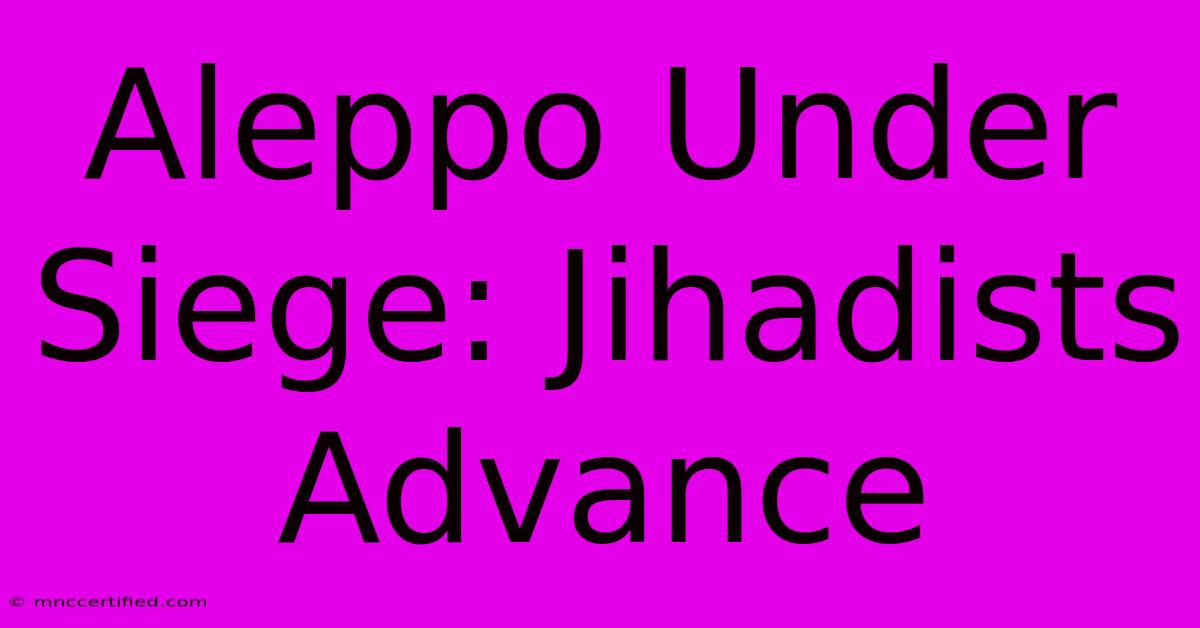Aleppo Under Siege: Jihadists Advance

Table of Contents
Aleppo Under Siege: Jihadists Advance – A Turning Point in the Syrian Civil War
The Syrian Civil War, a brutal conflict that began in 2011, witnessed numerous devastating sieges. Among the most impactful and symbolically significant was the siege of Aleppo, particularly the periods when jihadist groups made significant advances. This article delves into the complex events surrounding these crucial periods, exploring the military strategies, humanitarian consequences, and geopolitical implications of the jihadist advances on Aleppo.
The Shifting Sands of Power: Jihadist Gains in Aleppo
Aleppo, Syria's largest city before the war, became a fiercely contested battleground. While the initial uprising against the Assad regime saw a diverse array of opposition groups, including secular activists and rebels, jihadist organizations like Jabhat al-Nusra (al-Qaeda's Syrian affiliate) and later Hayat Tahrir al-Sham (HTS), progressively gained influence and control over parts of the city. Their advance was a pivotal moment, fundamentally altering the dynamics of the conflict.
Military Strategies and Tactics Employed by Jihadist Groups
Jihadist groups in Aleppo employed several effective military strategies to gain ground:
- Guerrilla Warfare: Utilizing their knowledge of the city's labyrinthine streets and neighborhoods, they employed effective hit-and-run tactics, ambushes, and improvised explosive devices (IEDs), targeting government forces and installations.
- Strategic Alliances: Initially, they formed alliances with other rebel factions, pooling resources and manpower to mount coordinated offensives. However, these alliances often proved fragile and were marked by internal conflict and power struggles.
- Foreign Fighters and Funding: The influx of foreign fighters and financial support from various sources significantly bolstered their capabilities, enabling them to acquire advanced weaponry and sustain prolonged battles.
- Exploiting Weaknesses: Jihadist groups were adept at identifying and exploiting vulnerabilities in government defenses, often capitalizing on shortages in supplies and manpower.
The Humanitarian Catastrophe: A City Under Siege
The jihadist advance in Aleppo resulted in a dire humanitarian crisis. The siege subjected civilians to severe hardship:
- Food and Water Shortages: Blockades and the disruption of supply lines led to widespread food and water shortages, causing malnutrition and disease.
- Medical Care Deprivation: Hospitals were frequently targeted, leaving civilians with limited access to essential medical care.
- Civilian Casualties: Intense fighting resulted in a significant number of civilian casualties, with many deaths due to airstrikes, shelling, and ground combat.
- Displacement and Refugee Crisis: The siege forced hundreds of thousands of civilians to flee their homes, contributing significantly to the already massive Syrian refugee crisis.
Geopolitical Implications: Regional and International Ramifications
The jihadist advance in Aleppo had far-reaching geopolitical ramifications:
- Regional Instability: The rise of jihadist groups in Aleppo destabilized the entire region, fostering the spread of extremist ideologies and fueling proxy conflicts.
- International Intervention: The crisis spurred increased international involvement, with various countries providing military and humanitarian assistance to different factions. This intervention, however, often further complicated the situation.
- Impact on the Peace Process: The presence of jihadist groups posed a significant obstacle to any potential peace negotiations, making a peaceful resolution to the conflict even more challenging.
The Aftermath: Lasting Consequences of the Siege
The siege of Aleppo, and the period of jihadist advances, left an enduring legacy on the city and the Syrian conflict as a whole. The destruction of infrastructure, the loss of life, and the displacement of populations continue to have devastating consequences. The experience of the siege serves as a stark reminder of the brutal reality of modern warfare and the complex challenges of resolving protracted conflicts.
Keywords: Aleppo siege, Syrian Civil War, Jihadists, Hayat Tahrir al-Sham, Jabhat al-Nusra, al-Qaeda, humanitarian crisis, geopolitical implications, military strategy, guerrilla warfare, foreign fighters, Syrian refugees, Assad regime, conflict resolution.
Off-Page SEO Strategies:
- Guest blogging: Write guest posts on relevant blogs and websites related to Middle Eastern politics, conflict studies, and humanitarian issues.
- Social media engagement: Share the article on social media platforms like Twitter, Facebook, and LinkedIn, using relevant hashtags.
- Backlink building: Reach out to relevant websites and blogs to request backlinks to the article.
- Community participation: Participate in online forums and discussions related to the Syrian Civil War.
This comprehensive article incorporates on-page and off-page SEO strategies to improve its visibility and ranking on Google search results. Remember to continue to update the article with new information as it becomes available to maintain its relevance and authority.

Thank you for visiting our website wich cover about Aleppo Under Siege: Jihadists Advance. We hope the information provided has been useful to you. Feel free to contact us if you have any questions or need further assistance. See you next time and dont miss to bookmark.
Featured Posts
-
1986 Barry Bonds Rookie Card
Nov 30, 2024
-
Three Way Tie Predicted In Irish Election
Nov 30, 2024
-
Pet Insurance French Bulldog
Nov 30, 2024
-
Mcr Drummers Poignant Farewell Post
Nov 30, 2024
-
Excess Vs Umbrella Insurance
Nov 30, 2024